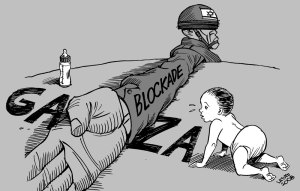 In part 1, I noted that the roadblocks to a sustainable truce in Gaza were: justice, humanitarian aid and clarity in Gaza.
In part 1, I noted that the roadblocks to a sustainable truce in Gaza were: justice, humanitarian aid and clarity in Gaza.
First, justice must be served because Israel has been accused of (knowingly) bombing civilian targets, e.g., the UN school and zoo, and using DIME (Dense Inert Metal Explosive), white phosphorous and flechettes (small darts released from shells), which are controversial weapons, especially when deployed against civilians. A number of organizations, institutions, and countries have begun investigating these allegations. Furthermore, an elusive, but by no means weak, notion has floated around that, despite what the courts decide, Israel acted unethically in the bombardment by using excessive force and denying humanitarian aid, which compounded to create unnecessary human suffering. So far Israel has not apologized but asserted that they have a moral obligation to protect their citizens, and indeed they do; however, they also have a moral obligation to abide by human rights legislation.
At present, very little, if any, humanitarian aid has made it into Gaza and very little, including injured children, has made it out — the carnations on Valentine’s Day were one exception. Again Israel deserves security, but Gazans deserve medical and humanitarian assistance, especially in such deplorable conditions. The verdict will not lie with the courts because excessive force remains somewhat abstract, despite the 100 to 1 mortality ratio, but will lie with public opinion. Currently, at least one organization campaigns against the budget request for military aid to Israel ($31 billion in Bush’s tenure and $53 billion in total plus $1 billion worth of fuel since 2004). Although there was a general discomfort at the violence of the bombardment, few people, and fewer nations, have condemned Israel. (However, Israel’s Ambassador to Sweden did have a shoe thrown at him.) Everyone has their own reasons: some do not want to be labelled a radical and others feel they do not have enough information to speak out.
For the hesitant ones, some anonymous action exists: in the States you can send a letter asking President Obama to reconsider sending military aid or you can send one to Sen. Kerry and Representatives Baird and Ellison thanking them for visiting Gaza. For those lacking information, Voices for Creative Nonviolence lists these sources (.pdf). Unfortunately, most mainstream media has been hesitant to appear radical, or at least unsympathetic to the Holocaust, but this appears to be changing. CBS recently produced a 60 Minutes segment that provided a balanced view of the issues relating to the West Bank.
 Nevertheless, with respect to the Gaza bombardment, there was a media blackout. John Snow took an innovative approach and made an excellent documentary on the effect of the blackout. Unfortunately, media timidity manifested itself when British broadcasters refused to air DEC’s appeal. Tony Benn reacted by taking matters into his own hands and provided DEC’s contact info against the host’s wishes; furthermore, El Baradei, the IAEA chief, reacted by boycotting the BBC. Alex Thomson of the BBC plodded on and at times struck gold: check out how he handles Mark Regev here.
Nevertheless, with respect to the Gaza bombardment, there was a media blackout. John Snow took an innovative approach and made an excellent documentary on the effect of the blackout. Unfortunately, media timidity manifested itself when British broadcasters refused to air DEC’s appeal. Tony Benn reacted by taking matters into his own hands and provided DEC’s contact info against the host’s wishes; furthermore, El Baradei, the IAEA chief, reacted by boycotting the BBC. Alex Thomson of the BBC plodded on and at times struck gold: check out how he handles Mark Regev here.
Time can bring perspective, but it can also fade issues into irrelevance, e.g., no reprimand or consequence came from the excellent reporting by Dan Rather and Human Rights Watch regarding Israel’s use of cluster munitions in Southern Lebanon. In the excellent segment by CBS, Livni states that she will remove all settlers to facilitate a two state solution (a separate Israel and Palestine); however, nothing so far indicates otherwise: wall construction, home destruction, and mass arrests continue.
As Uri Avnery provides an excellent breakdown of what may happen as a result of the election, it is clear that something must happen; hopefully justice, humanitarian aid, and media clarity coupled with Obama’s determination and Mitchell’s skill will result in something unthinkable — peace or at least a long term truce with open borders. If the strong desire of this Gaza survivor for peace is any indication, it may yet be thinkable.



No comments:
Post a Comment